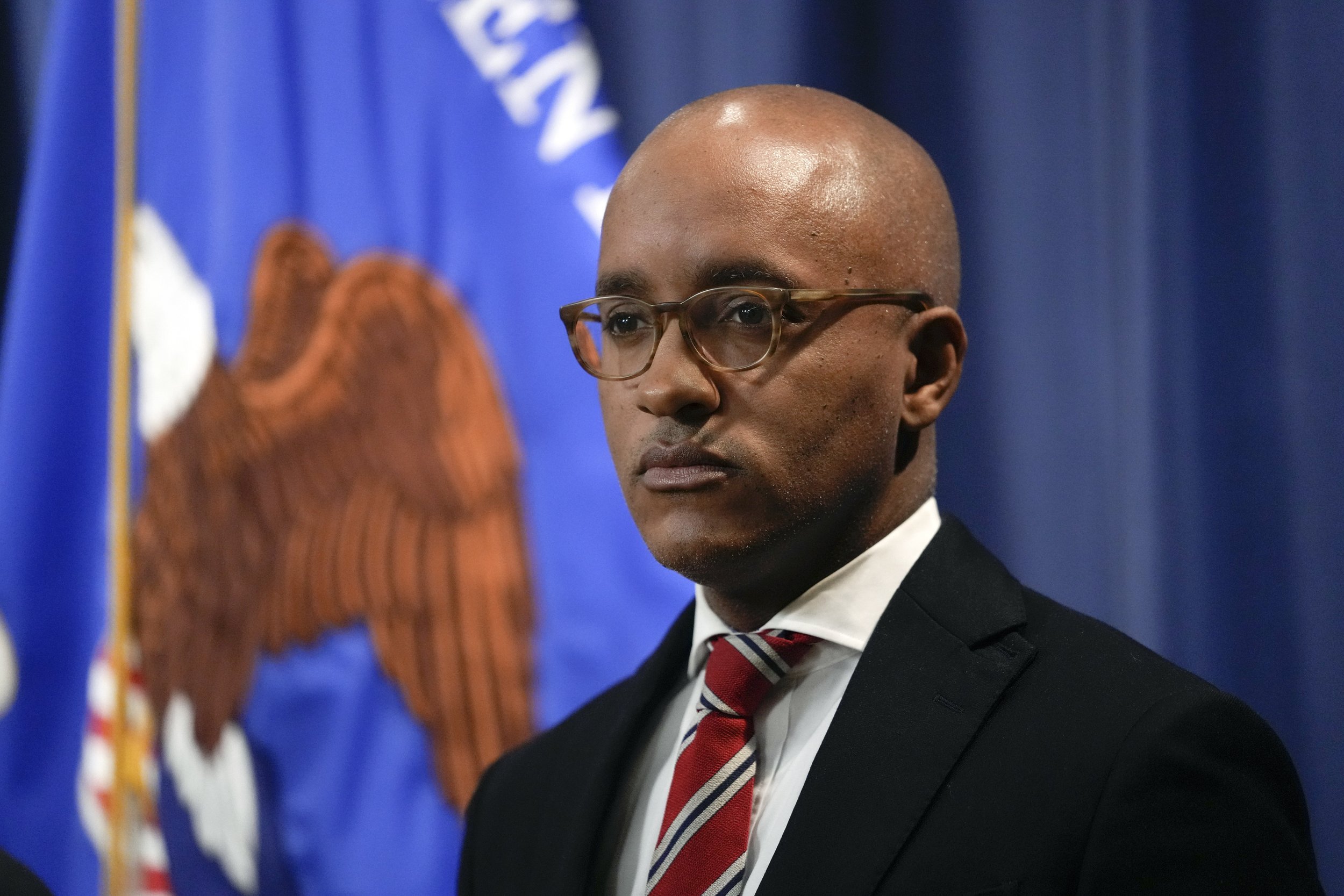Legal Aid officially files for federal takeover of Rikers Island
/The Legal Aid Society officially filed for a federal receivership of Rikers Island last week. AP file photo by Seth Wenig
By Jacob Kaye
Attorneys with the Legal Aid Society and prosecutors with the U.S. attorney’s office for the Southern District of New York officially asked a federal judge on Friday to strip the city of its control over Rikers Island and hand the jail complex over to a federal authority.
In a largely expected move, the public defense firm formerly called on federal Judge Laura Swain to institute an extreme judicial order known as a federal receivership, which could see the city lose its authority over Rikers Island and see it handed over to a court-appointed receiver.
Though the process for calling for a receiver began over the summer, Friday’s filing from the Legal Aid Society marks the furthest the city has come to losing control over the jail complex, where over two dozen people have died in the last two years.
A ruling on the motion isn’t expected until next February at the earliest, and the city will have several opportunities to argue why it should remain in control of the troubled jail.
But in its filing, the public defense firm claimed that the court is out of options – no other court order has or will get the city and its Department of Correction to comply with the 2015 consent judgment reached in the detainee rights case known as Nunez v. the City of New York, which centered around abusive treatment from correctional officers, the Legal Aid Society said.
The over 100-page filing attempts to lay out the case for receivership, arguing that the DOC has “overwhelmingly” not complied with the heart of the consent judgment. Use of force incidents have continued, and the DOC hasn’t done much to hold staff accountable when they cross the line, the filing argues. The Legal Aid Society also argues that the DOC has generally failed to keep detainees safe on Rikers Island and that “the risk of severe harm in the jails is as imminent, if not more imminent, in the present moment as it was when the consent judgment was entered.”
“The levels of violence and brutality in the city jails that exist today were unimaginable when the consent judgment was entered in 2015, and the city has demonstrated through eight years of recalcitrance and defiance of court orders that it cannot and will not reform its unconstitutional practices,” Mary Lynne Werlwas, the director of the Prisoners’ Rights Project at The Legal Aid Society, said in a statement.
“A receiver with the authority and mandate to make the difficult decisions the city will not is needed to secure the progress that two administrations and multiple Correction commissioners have all failed to achieve, and protect the constitutional rights of all people incarcerated in New York City jails,” she added.
The filing comes just as DOC Commissioner Louis Molina is set to depart his post for an assistant deputy mayor position inside City Hall, a move that has been described as a promotion by Mayor Eric Adams. Nonetheless, the city will see a leadership change in the DOC’s top position as it attempts to defend itself from having its main jail largely taken out of its control.
Much of the argument for receivership made by the Legal Aid Society has been laid out by federal monitor Steve J. Martin, who was charged by the federal court to keep track of the DOC’s commitment to the consent judgment in 2015, in recent months. Martin, who has been less explicit in his support of receivership than the Legal Aid Society, has appeared to grow less trusting of the DOC and the Adams administration expressing doubts about their efforts to adhere to court orders and the monitor’s own recommendations to make the jail complex safer.
In addition to the public defenders and the monitor, U.S. Attorney Damian Williams, who has previously expressed support for receivership, joined in the Legal Aid Society’s call for a federal takeover of the jail on Friday.
In a letter to Swain, Williams also said that the court and the city have run out of options.
“For the more than eight years since the consent judgment was entered, defendants — under two administrations and four Department of Correction commissioners — have been unable or unwilling to implement the sweeping institutional reforms necessary to address the pervasive culture of violence in the jails and remedy the ongoing violation of the constitutional rights of people in custody,” Williams said. “Defendants have consistently failed to comply with core provisions of the consent judgment as well as the court’s numerous remedial orders designed to redress those violations, all of which were drafted with the input of defendants and entered with their consent.”
“The appointment of an independent receiver who reports only to this court and is empowered to take all necessary steps to promptly comply with this court’s orders is the best option to address the ‘unsafe, dangerous, and chaotic’ conditions plaguing the city’s jail system,” Williams added.
The process toward receivership began last year, when the Legal Aid Society first asked Swain if they could begin the process of filing a contempt of court motion against the city and the DOC. At that point, Mayor Eric Adams and Molina had only been in charge of the correctional complex for several months, and Swain ordered them to craft an “action plan” to get violent conditions at Rikers under control.
The action plan was created alongside the monitor and implemented last fall. However, the monitor, the Legal Aid Society and the U.S. attorney’s office have said in recent months that the action plan has largely failed to meet its promise, in part, because of the DOC’s inability or unwillingness to implement it properly.
U.S. Attorney Damian Williams joined the Legal Aid Society in its call to implement a federal receivership on Rikers Island last week.AP file photo by Carolyn Kaster
“Almost a year-and-a-half after the action plan, it is abundantly clear that the promised reforms and progress have not materialized,” Williams said in his letter to Swain. “And instead of partnering and collaborating with the monitor and his team as defendants represented, DOC has failed to consistently provide the monitor with complete, accurate, and reliable information and has repeatedly failed to consult with him on key areas related to the consent judgment.”
Williams, Martin, the Legal Aid Society and Swain have also all recently expressed concern over a number of incidents that they say indicates the city’s unwillingness to communicate with the monitor.
Most recently, the monitor said the DOC opened up a new unit for detainees believed to have committed arson without first consulting the monitoring team, as required by the consent judgment.
In a court order last week, Swain ordered the DOC to explain why they shouldn’t be held in contempt of court for the surreptitious unit. Swain also said that she wasn’t convinced that Molina’s move to City Hall and new leadership at the DOC would have the positive effect the Adams administration seems to suggest it will. In fact, Swain said that the move has sparked confusion at what should be considered a crucial time, and asked the DOC explicitly who is in charge of the agency.
What might receivership look like?
Just what a federal receivership may look like will largely depend on Swain.
In their filing, the Legal Aid Society calls for a receiver with broad powers, but only those that fall within the application of the consent judgment, a view also supported by the U.S. attorney.
“Plaintiffs do not currently seek an order that contains any substantive requirements beyond what the court has thus far commanded, but rather seek the appointment of a receiver who will work to achieve compliance with the orders this court has already entered,” the Legal Aid Society said in their filing. “All relief the Court has ordered is ‘intended to ensure compliance with [the] core constitutional command’ to refrain from the use of excessive or unnecessary force.”
But the scope of a receiver’s powers, should one be implemented, still could be relatively vast.
A receiver would likely have the power to hire and fire DOC personnel related to the implementation of the consent judgment. They would also likely not be required to operate within the bounds of the labor agreement currently in place between the city and the correctional officers’ union and would have the ability to negotiate a new contract.
The DOC commissioner – whoever they may be – will still have some control over Rikers Island but will have the “powers granted to the receiver is suspended for the duration of the receivership,” according to the proposed court order from the Legal Aid Society. However, the commissioner would be expected to “work closely with the receiver to facilitate the receiver’s ability to perform their duties.”
The exact role of a receiver won’t be defined unless Swain rules that one is required. That ruling likely won’t come until the end of the first quarter of next year.





